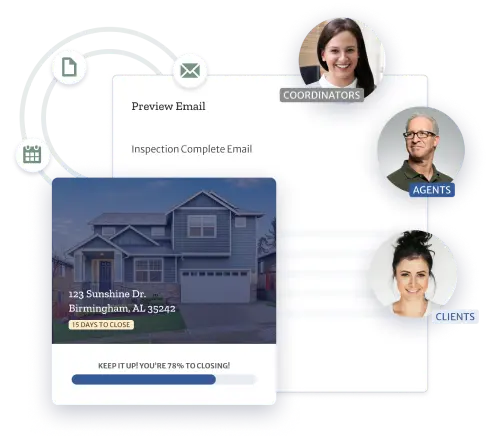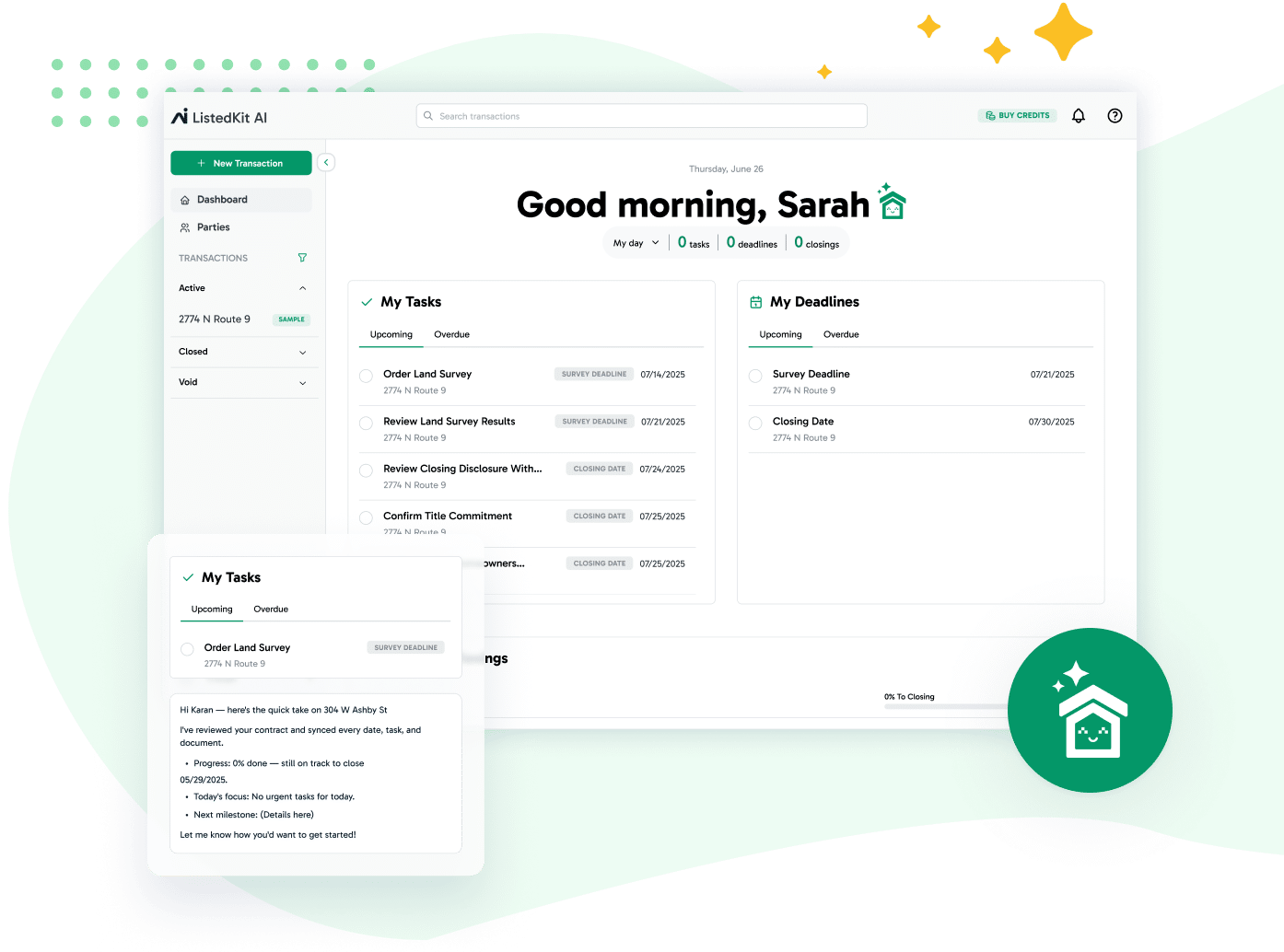Every delay, every missed deadline, and every lost document comes with a cost. Tracking deals through spreadsheets and scattered emails might seem manageable, but when multiple transactions pile up, small inefficiencies turn into expensive mistakes.
Time isn’t just money—it’s deals closed, commissions earned, and relationships maintained. Manually managing transactions doesn’t just slow you down; it creates unnecessary stress and puts your business at risk.
The real question isn’t whether real estate deal management software is worth the investment. It’s how much it’s already costing you to work without it. Let’s break down why the right platform helps you stay organized and pays for itself in time saved and revenue protected.
The Real Cost of Managing Deals Manually
Handling multiple transactions without the aid of an organized system causes delays, communication breakdown, and risk for non-compliance.
Even experienced real estate agents struggle when keeping track of deal flow through various platforms, chains of emails, and sheets.
Without a common platform, one can easily lose track of the progress of transactions, miss the all-important dates for contracts, or rummage around for documents at the eleventh hour.
Here are the other issues you can face without good real estate deal management software:
Missed Deadlines Can Stall the Entire Process
Deadlines are non-negotiable in the real estate industry. Every contract includes time-sensitive milestones like:
- Inspection contingencies that must be met before moving forward.
- Financing deadlines determine whether a deal closes on time.
- Closing dates that dictate the completion of the transaction.
A missed contingency deadline can disrupt a transaction, potentially leading to an extension, renegotiation, or additional legal considerations.
In some cases, buyers or sellers may need to renegotiate terms, while in others, deals may fall through altogether. Keeping track of these deadlines manually increases the likelihood of such risks.
Scattered Communication Creates Frustration
The typical real estate transaction involves agents, brokers, lenders, attorneys, title companies, and buyers or sellers. Each party communicates through email platforms, phone calls, and messaging apps, leading to:
- Lost messages in long email threads
- Conflicting information between multiple parties
- Duplicate or outdated document versions being shared
Without a centralized system, agents spend valuable time searching for updates across multiple email threads and messaging apps.
Clients who do not receive timely updates may feel uncertain about their transaction status. A transaction management platform keeps communication organized, improving transparency between all parties.
Compliance Risks and Legal Challenges
Real estate brokers and real estate firms must manage contract storage, compliance tracking, and audit trails to meet industry regulations.
While non-compliance can sometimes lead to penalties, the consequences vary by jurisdiction. Without a document management system, risks include:
- Difficulty in retrieving required disclosures or compliance documents when needed.
- Increased challenges in tracking transaction records for audit purposes.
- Time-consuming manual processes when resolving tax or legal disputes.
Repetitive Tasks that Waste Valuable Time
Manual business processes create unnecessary administrative work. Agents, brokers, and transaction coordinators spend hours:
- Manually updating to-do lists for every transaction.
- Sending repetitive email follow-ups for missing documents.
- Tracking commissions and payouts without an automated system.
Without workflow automation, real estate teams must manually track task lists, send reminders, and update transaction statuses.
This increases administrative workload and reduces time available for client-focused activities.
A real estate task management platform helps streamline these things, allowing agents and coordinators to focus on negotiations and closing transactions.
How Real Estate Deal Management Software Improves Your Workflow
A real estate transaction management solution combines task tracking, document storage, compliance monitoring, and communication in one centralized system.
While it reduces manual tracking and errors, human oversight is still required to ensure accuracy and completeness.
Customizable Checklists and Task Management
A deal management platform allows teams to create custom transaction checklists based on their specific workflow. This includes:
- Auto-populated task lists tailored for buyers, sellers, and different transaction types.
- Automated task reminders to keep deals moving forward.
- Role-based task assignments so each team member only sees what’s relevant.
With custom workflows, custom tasks, and custom transaction views, transaction coordinators can streamline daily operations while staying compliant.
Centralized Document Management and Compliance Tracking
A document library eliminates scattered paperwork by storing everything in one place, making it easy to:
- Access contracts, addendums, and disclosures instantly.
- Share files securely with clients and stakeholders.
- Automatically track document changes and approvals.
Real estate brokers benefit from compliance tracking features that help maintain records for audits and regulatory reviews, reducing risks associated with legal documents.
Seamless Collaboration with Third-Party Tools
An estate broker transaction management system integrates with third-party tools such as:
- Google Drive & Google Workspace for document sharing.
- Google Calendar for scheduling deadlines.
- E-signature platforms to streamline contract signing.
- Accounting software for commission tracking and financial reporting.
Integrating with third-party tools like Google Drive, MLS, and accounting software helps keep transaction data accessible in one place.
While integration enhances collaboration, transaction delays can still occur due to lender approvals, appraisal issues, or external processing times.
Data-Driven Insights for Smarter Decision-Making
Transaction management software provides analytics on deal timelines, contract delays, and revenue trends, helping decision-makers refine their transaction workflow.
These insights allow real estate professionals to identify inefficiencies and adjust their business strategies accordingly.
- Detailed reports on average deal timelines and common roadblocks.
- Pipeline feature tracking for monitoring transaction flow.
- Financial tracking tools to analyze commissions, expenses, and profitability.
Key Features to Look for in Real Estate Deal Management Software – Quick Overview
| Feature | Why It Matters | Considerations |
| Task Management Tools | Keeps transactions on schedule. | Includes custom transaction checklists and auto-reminders. |
| Document Storage & Compliance | Prevents missing paperwork and legal risks. | Needs built-in document signing functionality and audit trails. |
| Collaboration & Communication | Keeps agents, lenders, and clients informed. | Supports email tracking, contact management, and secure messaging. |
| Seamless Integration | Connects with other essential tools to reduce duplicate data entry. | Works best for teams with high transaction volume and a larger software budget—look for options that sync with Google Workspace, MLS, and accounting software. |
| Financial Tracking & Commission Management | Helps brokers manage revenue and agent payments more efficiently. | More useful for high-volume brokerages with a larger software budget—features like financial reporting, commission tracking, and export lists improve oversight. |
3 Best Real Estate Deal Management Software Solutions
With multiple transaction management software vendors in the market, choosing the ideal choice depends on business needs.
1. ListedKit
Voted as the Top Real Estate AI Startup in 2024 by the Inman AI Awards, ListedKit helps teams stay organized, work efficiently, and scale without stress.
It simplifies deal management by reducing manual work and keeping everything in one place for real estate teams and TCs.
Whether you’re managing a handful of transactions or handling over a hundred at once, ListedKit gives you the structure to keep deals moving without the usual bottlenecks.
Key Features:
- AI-Powered Contract Processing. Extracts key details in seconds, cutting down on data entry.
- Smart Checklists. Adjusts task deadlines automatically when closing dates change.
- Automated Email Templates. Pre-fills transaction details, reducing manual work and sending accurate updates.

Manage Real Estate Deals with Speed and Precision
ListedKit automates contract processing, tracks deadlines, and keeps every transaction on schedule.
2. Paperless Pipeline
Paperless Pipeline is a trusted transaction management platform for over 16 years. It focuses on making deal tracking and compliance easier while giving teams the flexibility to work their way.
It allows real estate teams to add unlimited agents and pay only for transactions—making it an appealing option for brokerages and TCs looking to scale without high overhead costs.
Key Features:
- Custom Checklists. Set up transaction workflows based on property type, location, or deal status.
- Automated Task Reminders. Assign tasks, set deadlines, and notify agents when contract items need attention.
- Compliance & Audit Tracking. Maintain a transaction history log with time-stamped document reviews and broker approvals.
3. Dotloop
Dotloop helps real estate teams manage high-volume transactions by bringing contract preparation, document sharing, and compliance tracking into one platform.
Designed for large teams and multi-location brokerages, it eliminates the need for multiple tools by combining the important features in a single system. Dotloop is ideal for teams handling multiple large-scale transactions.
Key Features:
- Document Sharing & eSignatures. Create, send, and sign contracts digitally, keeping transactions moving without in-person meetings.
- Transaction Templates. Standardize workflows with reusable templates for compliance, task management, and document submissions.
- Real-Time Collaboration. Share updates, receive instant notifications, and manage transactions across multiple offices or locations.
Scaling Your Real Estate Business with Deal Management Software
Growing a real estate business means handling more transactions without sacrificing client satisfaction. Here’s how real estate deal management software can help you beyond automation:
Faster Closings = More Revenue
- Less time spent on repetitive tasks means agents can focus on closing more real estate deals.
- A real estate transaction management system eliminates unnecessary administrative tasks, reducing the risk of stalled transactions.
- Automated document management, task tracking, and financial reporting create a smoother sales process that maximizes profitability.
A Better Client Experience = More Referrals
- Client relationships improve when transactions move forward without unnecessary delays.
- Buyers and sellers feel informed with branded client portals, where they can track their transaction progress without waiting for status updates.
- A well-organized transaction leads to better client engagement, resulting in repeat business and word-of-mouth referrals.
Less Stress = More Productivity
- Workflow automation reduces time spent on to-do lists, email tracking, and compliance tracking.
- Agents and real estate brokers can dedicate more time to nurturing potential clients instead of handling manual business processes.
- A well-structured deal management platform helps real estate teams stay organized without increasing workload.
Compliance & Audit Readiness
- Secure document storage ensures all contracts and legal documents are easily accessible and audit-ready.
- Regulatory requirements vary across markets—having a transaction management software solution with compliance tracking features helps teams stay organized.
- Features like options for audit trail tracking, detailed reports, and customizable document libraries make compliance effortless.
While software assists with document tracking and audit preparation, brokers and agents must still stay informed on regional laws and contract requirements.
Upgrade Your Workflow and Close More Deals
Managing real property transactions manually creates avoidable bottlenecks that stall deals, render administrative work redundant, and disrupt communication.
A real estate deal management platform helps groups work more efficiently, maintain transactions under their control, and avoid delays and risk of non-compliance.
Key Takeaways:
- Automate repetitive processes such as contract handling, tracking deadlines, and communication with clients.
- Improve accuracy and conformity by keeping documents, audit trails, and transaction forms.
- Enhance collaboration by adopting eSignatures, CRMs, and financial tracking tools.
- Increase efficiency by streamlining workflows and keeping each transaction right on schedule.
Simplify deal management with ListedKit—get started today!




